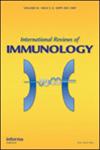急性链球菌感染后肾小球肾炎的发病机制分析。
IF 4.3
4区 医学
Q2 IMMUNOLOGY
International Reviews of Immunology
Pub Date : 2021-01-01
Epub Date: 2020-10-08
DOI:10.1080/08830185.2020.1830083
引用次数: 11
摘要
越来越多的证据支持免疫系统在急性链球菌后肾小球肾炎(APSGN)中的核心作用,但目前关于链球菌生物学如何影响免疫,反之亦然的观点仍有待澄清。肾小球免疫复合物沉积是APSGN发生的关键;然而,免疫复合物形成之前的机制可以调节疾病的发生和发展。肾炎涉及的初始和晚期肾脏事件也可能与宿主因素和链球菌因素有关。本文综述了APSGN的发病机制,链球菌产物与肾细胞和白细胞的相互作用,不同肾源性抗原在肾环境中的可能作用,以及APSGN不仅仅是由单一链球菌抗原及其抗体引起的可能性;相反,肾脏损害可能是与链球菌和宿主因素相关的不同因素同时作用的结果。解决这些问题将有助于我们更好地理解APSGN的生理病理。本文章由计算机程序翻译,如有差异,请以英文原文为准。
Acute post-streptococcal glomerulonephritis: analysis of the pathogenesis.
Abstract Increasing evidence supports a central role of the immune system in acute post streptococcal glomerulonephritis (APSGN), but the current view of how streptococcal biology affects immunity, and vice versa, remains to be clarified. Renal glomerular immune complex deposition is critical in the initiation of APSGN; however, mechanisms previous to immune complex formation could modulate the initiation and the progression of the disease. Initial and late renal events involved in the nephritis can also be related to host factors and streptococcal factors. In this review we describe the mechanisms reported for the APSGN pathogenesis, the interactions of streptococcal products with renal cells and leukocytes, the possible effects of different nephritogenic antigens in the renal environment and the possibility that APSGN is not just due to a single streptococcal antigen and its antibody; instead, kidney damage may be the result of different factors acting at the same time related to both streptococcus and host factors. Addressing these points should help us to better understand APSGN physiopathology.
求助全文
通过发布文献求助,成功后即可免费获取论文全文。
去求助
来源期刊
CiteScore
11.00
自引率
4.00%
发文量
24
期刊介绍:
This review journal provides the most current information on basic and translational research in immunology and related fields. In addition to invited reviews, the journal accepts for publication articles and editorials on relevant topics proposed by contributors. Each issue of International Reviews of Immunology contains both solicited and unsolicited review articles, editorials, and ''In-this-Issue'' highlights. The journal also hosts reviews that position the authors'' original work relative to advances in a given field, bridging the gap between annual reviews and the original research articles.
This review series is relevant to all immunologists, molecular biologists, microbiologists, translational scientists, industry researchers, and physicians who work in basic and clinical immunology, inflammatory and allergic diseases, vaccines, and additional topics relevant to medical research and drug development that connect immunology to disciplines such as oncology, cardiovascular disease, and metabolic disorders.
Covered in International Reviews of Immunology: Basic and developmental immunology (innate and adaptive immunity; inflammation; and tumor and microbial immunology); Clinical research (mechanisms of disease in man pertaining to infectious diseases, autoimmunity, allergy, oncology / immunology); and Translational research (relevant to biomarkers, diagnostics, vaccines, and drug development).

 求助内容:
求助内容: 应助结果提醒方式:
应助结果提醒方式:


